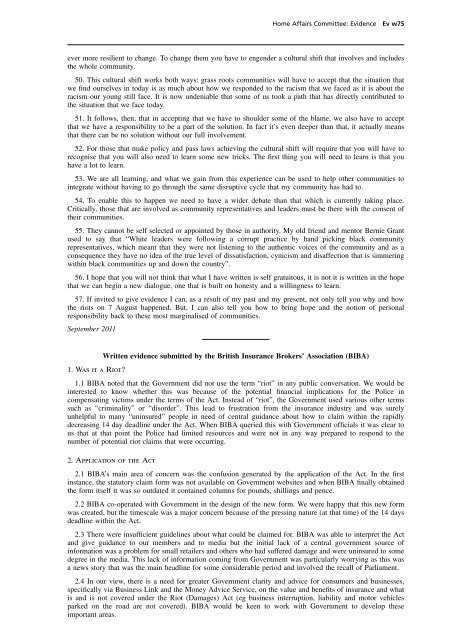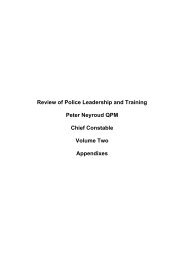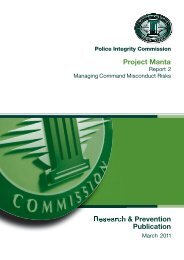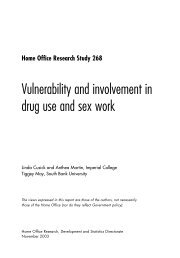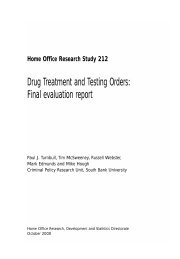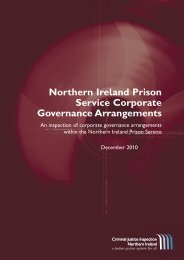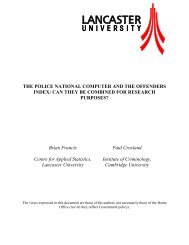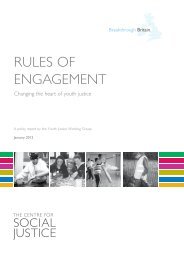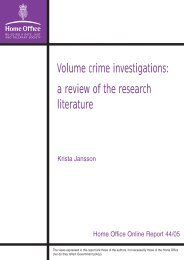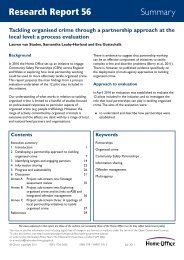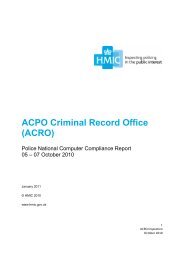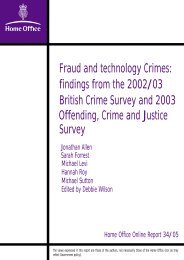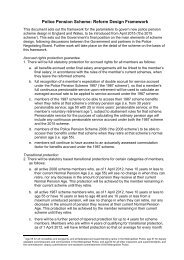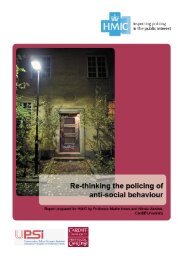Policing Large Scale Disorder: Lessons from the disturbances of ...
Policing Large Scale Disorder: Lessons from the disturbances of ...
Policing Large Scale Disorder: Lessons from the disturbances of ...
You also want an ePaper? Increase the reach of your titles
YUMPU automatically turns print PDFs into web optimized ePapers that Google loves.
Home Affairs Committee: Evidence Ev w75<br />
ever more resilient to change. To change <strong>the</strong>m you have to engender a cultural shift that involves and includes<br />
<strong>the</strong> whole community.<br />
50. This cultural shift works both ways: grass roots communities will have to accept that <strong>the</strong> situation that<br />
we find ourselves in today is as much about how we responded to <strong>the</strong> racism that we faced as it is about <strong>the</strong><br />
racism our young still face. It is now undeniable that some <strong>of</strong> us took a path that has directly contributed to<br />
<strong>the</strong> situation that we face today.<br />
51. It follows, <strong>the</strong>n, that in accepting that we have to shoulder some <strong>of</strong> <strong>the</strong> blame, we also have to accept<br />
that we have a responsibility to be a part <strong>of</strong> <strong>the</strong> solution. In fact it’s even deeper than that, it actually means<br />
that <strong>the</strong>re can be no solution without our full involvement.<br />
52. For those that make policy and pass laws achieving <strong>the</strong> cultural shift will require that you will have to<br />
recognise that you will also need to learn some new tricks. The first thing you will need to learn is that you<br />
have a lot to learn.<br />
53. We are all learning, and what we gain <strong>from</strong> this experience can be used to help o<strong>the</strong>r communities to<br />
integrate without having to go through <strong>the</strong> same disruptive cycle that my community has had to.<br />
54. To enable this to happen we need to have a wider debate than that which is currently taking place.<br />
Critically, those that are involved as community representatives and leaders must be <strong>the</strong>re with <strong>the</strong> consent <strong>of</strong><br />
<strong>the</strong>ir communities.<br />
55. They cannot be self selected or appointed by those in authority. My old friend and mentor Bernie Grant<br />
used to say that “White leaders were following a corrupt practice by hand picking black community<br />
representatives, which meant that <strong>the</strong>y were not listening to <strong>the</strong> au<strong>the</strong>ntic voices <strong>of</strong> <strong>the</strong> community and as a<br />
consequence <strong>the</strong>y have no idea <strong>of</strong> <strong>the</strong> true level <strong>of</strong> dissatisfaction, cynicism and disaffection that is simmering<br />
within black communities up and down <strong>the</strong> country”.<br />
56. I hope that you will not think that what I have written is self gratuitous, it is not it is written in <strong>the</strong> hope<br />
that we can begin a new dialogue, one that is built on honesty and a willingness to learn.<br />
57. If invited to give evidence I can, as a result <strong>of</strong> my past and my present, not only tell you why and how<br />
<strong>the</strong> riots on 7 August happened. But, I can also tell you how to bring hope and <strong>the</strong> notion <strong>of</strong> personal<br />
responsibility back to <strong>the</strong>se most marginalised <strong>of</strong> communities.<br />
September 2011<br />
1. Was it a Riot?<br />
Written evidence submitted by <strong>the</strong> British Insurance Brokers’ Association (BIBA)<br />
1.1 BIBA noted that <strong>the</strong> Government did not use <strong>the</strong> term “riot” in any public conversation. We would be<br />
interested to know whe<strong>the</strong>r this was because <strong>of</strong> <strong>the</strong> potential financial implications for <strong>the</strong> Police in<br />
compensating victims under <strong>the</strong> terms <strong>of</strong> <strong>the</strong> Act. Instead <strong>of</strong> “riot”, <strong>the</strong> Government used various o<strong>the</strong>r terms<br />
such as “criminality” or “disorder”. This lead to frustration <strong>from</strong> <strong>the</strong> insurance industry and was surely<br />
unhelpful to many “uninsured” people in need <strong>of</strong> central guidance about how to claim within <strong>the</strong> rapidly<br />
decreasing 14 day deadline under <strong>the</strong> Act. When BIBA queried this with Government <strong>of</strong>ficials it was clear to<br />
us that at that point <strong>the</strong> Police had limited resources and were not in any way prepared to respond to <strong>the</strong><br />
number <strong>of</strong> potential riot claims that were occurring.<br />
2. Application <strong>of</strong> <strong>the</strong> Act<br />
2.1 BIBA’s main area <strong>of</strong> concern was <strong>the</strong> confusion generated by <strong>the</strong> application <strong>of</strong> <strong>the</strong> Act. In <strong>the</strong> first<br />
instance, <strong>the</strong> statutory claim form was not available on Government websites and when BIBA finally obtained<br />
<strong>the</strong> form itself it was so outdated it contained columns for pounds, shillings and pence.<br />
2.2 BIBA co-operated with Government in <strong>the</strong> design <strong>of</strong> <strong>the</strong> new form. We were happy that this new form<br />
was created, but <strong>the</strong> timescale was a major concern because <strong>of</strong> <strong>the</strong> pressing nature (at that time) <strong>of</strong> <strong>the</strong> 14 days<br />
deadline within <strong>the</strong> Act.<br />
2.3 There were insufficient guidelines about what could be claimed for. BIBA was able to interpret <strong>the</strong> Act<br />
and give guidance to our members and to media but <strong>the</strong> initial lack <strong>of</strong> a central government source <strong>of</strong><br />
information was a problem for small retailers and o<strong>the</strong>rs who had suffered damage and were uninsured to some<br />
degree in <strong>the</strong> media. This lack <strong>of</strong> information coming <strong>from</strong> Government was particularly worrying as this was<br />
a news story that was <strong>the</strong> main headline for some considerable period and involved <strong>the</strong> recall <strong>of</strong> Parliament.<br />
2.4 In our view, <strong>the</strong>re is a need for greater Government clarity and advice for consumers and businesses,<br />
specifically via Business Link and <strong>the</strong> Money Advice Service, on <strong>the</strong> value and benefits <strong>of</strong> insurance and what<br />
is and is not covered under <strong>the</strong> Riot (Damages) Act (eg business interruption, liability and motor vehicles<br />
parked on <strong>the</strong> road are not covered). BIBA would be keen to work with Government to develop <strong>the</strong>se<br />
important areas.


